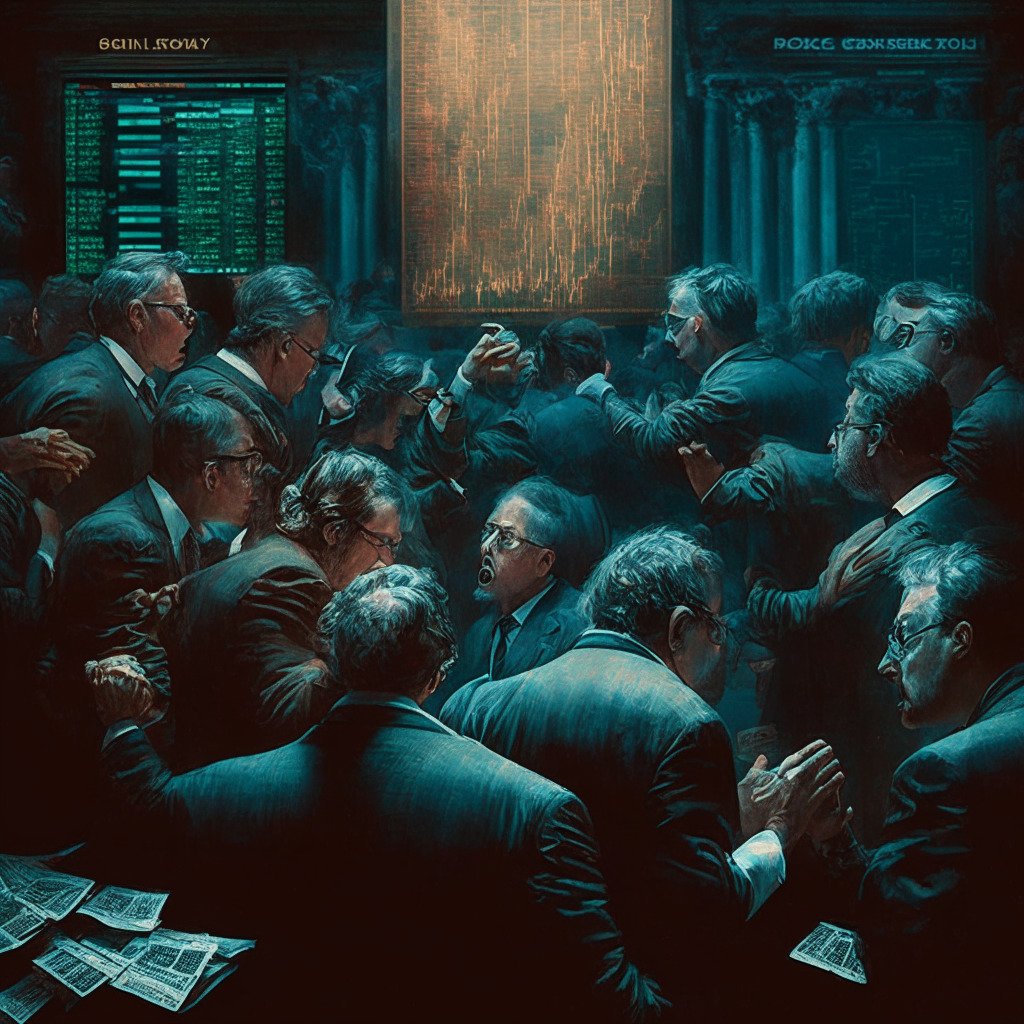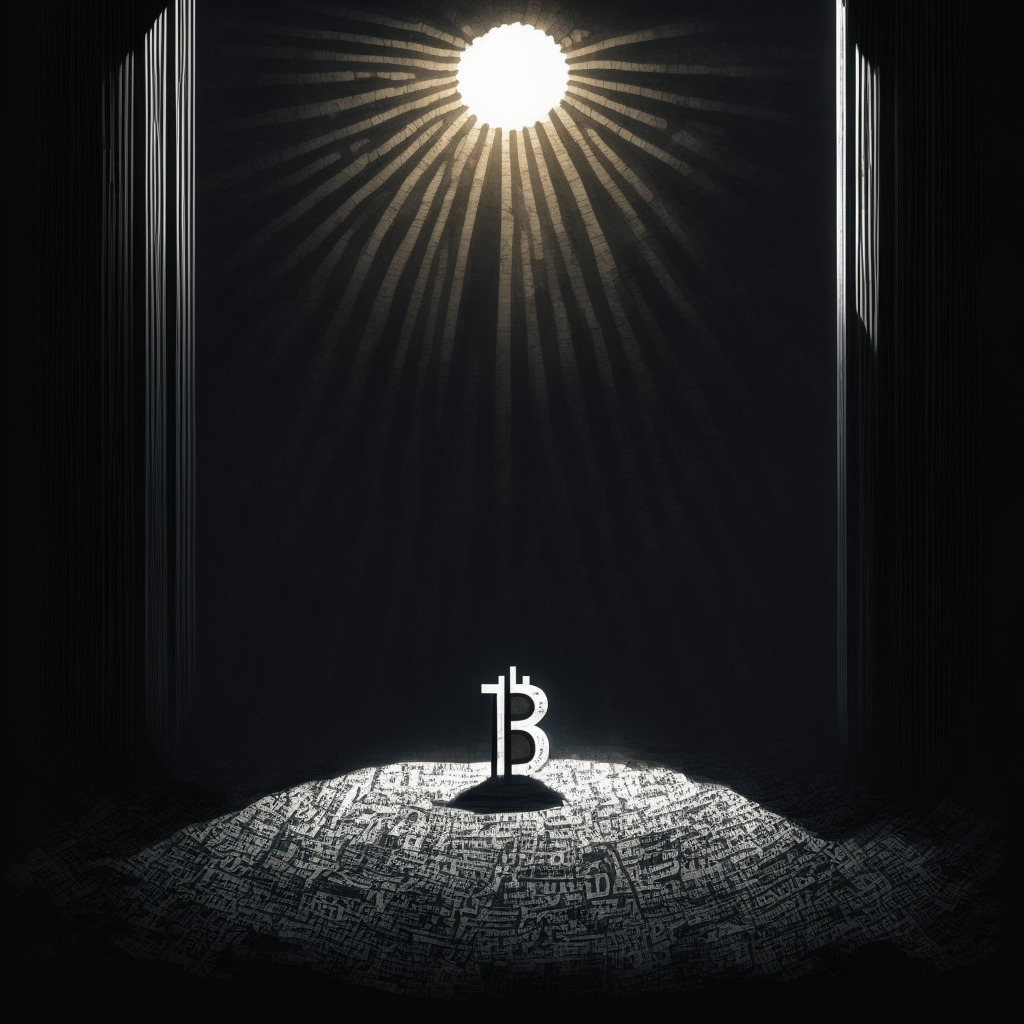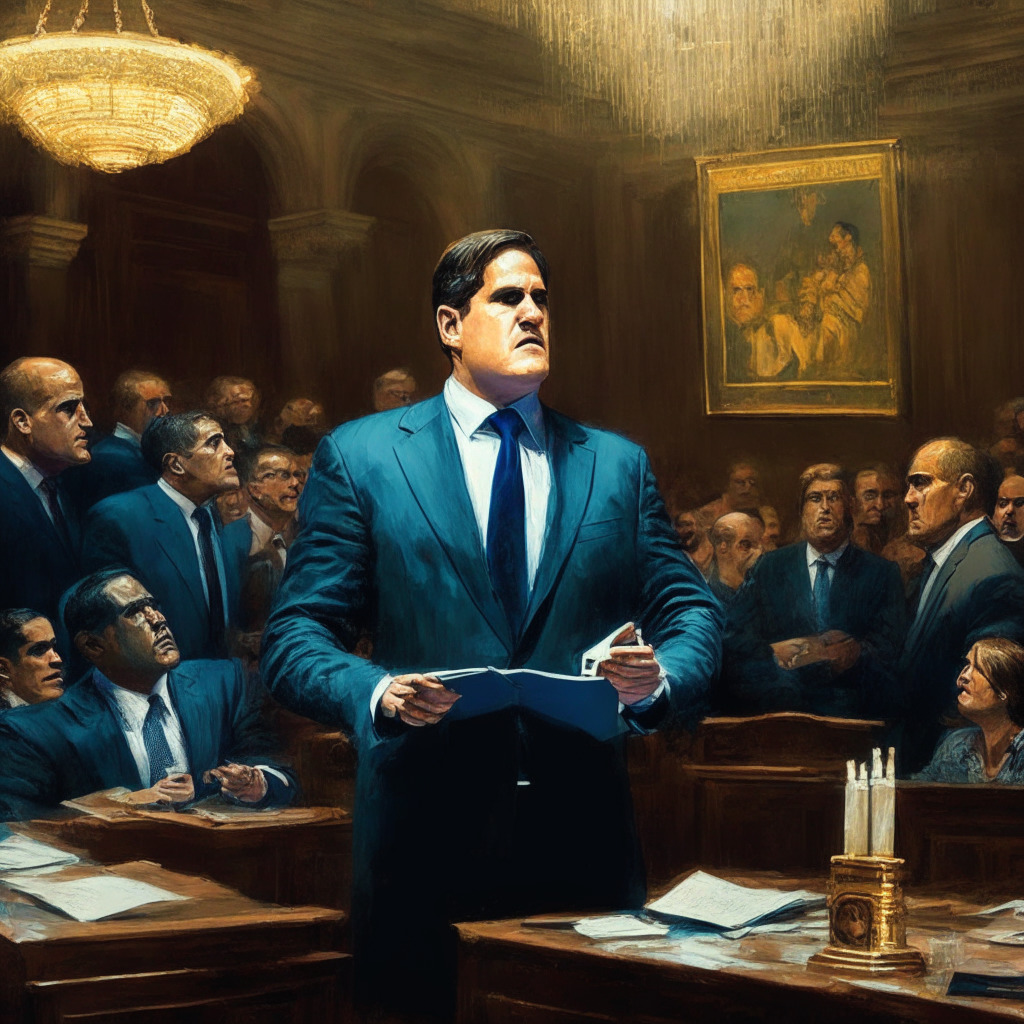“El Salvador, embracing Bitcoin as an alternative to traditional money, exemplifies growing trust in decentralized finance. Key contributors like Mi Primer Bitcoin aim to foster this trust through education. However, as we move towards this new future, skepticism remains over the hypothesized collapse of traditional financial systems.”
Search Results for: John Reed
Cry for Crypto Regulation: Ex-SEC Official Urges for Greater DOJ Involvement
Former SEC official John Reed Stark argues that the SEC’s current capabilities are insufficient to handle the growing, flexible crypto sector. Stark believes that the Department of Justice’s involvement is indispensable to impose penal measures as the SEC’s mandate restricts it to civil enforcement.
Bitcoin-Backed ETF Approval: Political Climate’s Influence and the 2024 Election Saga
“Former SEC official, John Reed Stark indicates that a spot Bitcoin-backed exchange-traded fund (ETF) approval in the US is unlikely in 2023, due to multiple considerations held by the current SEC. Crypto-friendly regulations and the approval of a Bitcoin spot ETF, might be more feasible with a Republican-led Administration and SEC Commissioner after the 2024 elections.”
Future of Bitcoin Spot ETFs: Pending Regulations and Political Influence’s Role
“Former SEC dignitary John Reed Stark speculates that the approval of Bitcoin Spot ETFs may be improbable due to regulatory hurdles. Despite Bitcoin price fluctuations, Stark believes a shift in political power towards Republicans could favor the crypto industry, potentially easing regulatory constraints and focusing more on fraudulent activities rather than registration violations. A move that could see Hester Pierce – ‘Crypto Mom’ – ascend the ranks, advocating for more crypto-friendly regulations.”
Shifting Political Winds: Potential Impact on US Crypto Regulatory Landscape Post 2024 Election
Recent comments from former SEC official John Reed Stark suggest potential changes to U.S. crypto regulation influenced by party politics. Stark attributes a pro-crypto regulation shift to a possible Republican win in 2024, ending current SEC chair Gensler’s tenure, and potentially paving the way for Hester Peirce, known for her softer stance on crypto.
Decoding the Cuban-Stark Showdown: SEC Regulations, Crypto Debacle, and the Japan Model
Mark Cuban and former SEC official, John Reed Stark, recently disagreed on social media over the cause of the FTX’s downfall. Cuban believes that if the US SEC had adopted regulations similar to Japan’s, US customers wouldn’t have suffered. However, Stark contends blaming SEC is unreasonable, insisting that even with robust compliance, crypto businesses like FTX wouldn’t comply.
Debate on Future of Crypto Regulations: Mark Cuban vs. SEC and the Confidence in Bitcoin’s Future
Mark Cuban and an ex-SEC official have weighed in on the future of cryptocurrency regulation amidst ongoing shifts in the industry. Cuban is critical of the SEC’s current approach, advocating for potential regulations including dedicated registration processes for cryptocurrencies. Contrastingly, ex-SEC official John Reed Stark criticizes Central Bank Digital Currencies for potential global financial risk, cybersecurity issues, and possible conflicts.
Billionaire Mark Cuban vs SEC: Finding Balance in Crypto Regulation and Innovation
Crypto Twitter hosted a debate between Mark Cuban and ex-SEC officer John Reed Stark, discussing the SEC’s legal actions against Binance and cryptocurrency regulation. The conversation highlighted differing perspectives on regulatory measures and the ongoing challenge to balance innovation with safety and security in the industry.
SEC Ex-Official’s Stark Warning: Crypto Platform Dangers, Regulatory Issues & DEX Alternatives
Former SEC Enforcement Division chief, John Reed Stark, warns cryptocurrency investors to “Get out of crypto platforms now” due to regulatory ambiguities and insufficient customer protection measures on centralized exchanges. Decentralized alternatives, offering better security and compliance, gain traction as concerns over legal scrutiny and cybersecurity grow.
SEC Crackdown on Influencer Fraud: Market Manipulation and Ensuring Transparency
The SEC is intensifying efforts to identify crypto influencers involved in promoting scams and manipulating token prices on social media. Former SEC Chief John Reed Stark warns of potential persecution and emphasizes that anti-fraud rules apply to all forms of price manipulation, including crypto-securities. Influencers must carefully vet projects, avoid price manipulation, and maintain transparency to ensure legal safety and trust.
Crackdown on Crypto Influencers: SEC Targets Fraudulent Promotions and Price Manipulation
Former SEC official John Reed warns social media influencers promoting and manipulating cryptocurrency prices that they will soon face anti-fraud regulations similar to those governing exchange-listed securities. The existing regulatory loopholes enabling fraudulent activities and price manipulation will likely close soon, as regulatory bodies like the SEC intensify their scrutiny.
Legal Spotlight on Crypto: Sam Bankman Fried’s Case and Its Impact on Blockchain Regulation
The high-profile legal proceedings against former FTX supremo, Sam Bankman Fried (SBF), involving charges of financial fraud, have placed the regulatory landscape of the cryptocurrency industry into sharp focus. These proceedings illustrate the potentially precarious path cryptocurrency pioneers may tread.
Navigating the Gray: Binance, Grayscale, and the Uncharted Legal Landscape of Crypto
“Binance, a leading cryptocurrency exchange, faces possible legal action from the US Securities and Exchange Commission (SEC), potentially linked to violations of sanctions involving Russia. Meanwhile, the SEC and Grayscale experience a landmark clash, highlighting evolving regulatory issues and the role of self-regulation in preserving the balance between financial freedom and investor protection in crypto markets.”
Binance and the SEC: Unraveling the Mystery behind the Secret Court Filing
“Binance, the massive cryptocurrency exchange, is facing escalating scrutiny due to a mysterious court filing from the Securities and Exchange Commission (SEC). The filing, controversially submitted under seal, has raised speculations about Binance’s forthcoming predicaments. Among the conjectures, one suggests the SEC is looking to avoid interference with a potential parallel criminal investigation.”
Navigating the Uncertainties: Unraveling the Bitcoin ETF, Regulatory Glitches and BTC Market Volatility
The US SEC’s delay on verdicts for Bitcoin ETF filings, coupled with Europe’s first Bitcoin ETF launch, creates uncertainty in the crypto market. Amidst this, Bitcoin Depot reports Q2 revenue growth. However, market apprehension, resulting from potential changes in crypto regulations, impacts BTC’s value, leading to a bearish climate and potential downward trend.
Bitcoin’s Subtle Dip and the Seismic Shocks Awaiting Crypto Markets: A Closer Look
“Bitcoin’s subtle dip in trading price can be attributed to insights from industry experts, company actions, and regulatory developments. The future prospects for Bitcoin seem promising, with its value fluctuating between core thresholds of $29,600 and $29,250. But remember, the realm of crypto is frenetic, where fortunes are made and lost overnight.”
Ripple Case Verdict Sparks Debate About Future of Digital Asset Regulation
The recent verdict in the Ripple case, acknowledging XRP as a security for institutional investors but not public sales, has sparked debate. Critics argue the decision creates a new asset class, shifting identities between securities and non-securities. Proponents, such as Ripple’s CEO Brad Garlinghouse, see potential for this ruling to shape crypto regulations. Overall, uncertainty pushes for Congress to provide clearer digital asset laws.
Binance Exodus & Legal Battles: Examining Crypto Exchange Under Fire
“Amid a tightening regulatory environment, key figures from Binance have stepped down, escalating concerns over the crypto exchange’s compliance. Accusations against Binance include deceptive practices, money laundering, and sanctions violations, with lawsuits already in motion. These challenges underscore the importance of robust regulatory compliance in the crypto industry.”
Binance vs SEC: Ongoing Legal Battle, Court Rulings, and Future Implications for Crypto
A U.S. District Court judge denied Binance’s motion to hinder the SEC from publicizing statements related to their ongoing legal dispute. The case involves allegations, including securities law violations and commingling of user funds. Binance is set to present its defense on September 21.
Major Questions Doctrine: A Relief for Crypto in SEC Lawsuits? Pros, Cons & Conflicts
The major questions doctrine, which requires explicit congressional approval for regulating areas of significant importance, may provide relief for Binance and Coinbase amidst SEC scrutiny. This legal aspect could potentially challenge the Chevron doctrine, which grants regulatory agencies broad discretion, and promote regulatory clarity for the cryptocurrency industry.
Binance.US and SEC Agreement: Groundbreaking Crypto Exchange Transparency
Binance.US and the SEC reached an unprecedented agreement for greater transparency and oversight of the cryptocurrency exchange. Binance will ensure its U.S. holding companies maintain control over customer assets, while the SEC gains a monitoring role, aiming to improve transparency and security within the crypto industry.
Mark Cuban vs SEC: The Urgent Need for Clear Crypto Regulations and Industry Growth
Mark Cuban accuses the SEC of hindering crypto startups with unclear regulations, urging for specific guidelines on crypto assets classification and product registration. The debate emphasizes the necessity of regulatory clarity to maintain the growth, success, and innovation within the blockchain and cryptocurrency sector.
Binance Cloud Mining Service: Pros, Cons, and Regulatory Challenges
Binance is launching a subscription-based Bitcoin cloud mining service, allowing users to purchase hashrates without investing in equipment. However, due to SEC allegations, the service is unavailable for US investors, highlighting challenges and regulatory uncertainties faced by cryptocurrency exchanges.
Binance vs SEC: Potential Settlement Paves Way for Crypto Industry Future
In a recent hearing, U.S. District Judge Amy Berman Jackson declined the SEC’s request to freeze Binance’s US arm assets, leading experts to suggest a possible settlement. The federal judge requested a mediation hearing, raising questions about the SEC’s approach towards the crypto industry. The case’s outcome could have broader implications for the relationship between crypto exchanges and regulatory authorities.
Binance US vs. SEC: The Clash that Could Shape Crypto Regulation and Innovation
Binance US faces 13 serious charges from the SEC, including operating unregistered exchanges and misrepresenting trading controls. They’ve tapped a high-profile legal team, led by former SEC Division of Enforcement co-director George Canellos. The case raises concerns about striking the right balance between investor security and fostering growth in the blockchain and crypto industries.
Binance.US Fights SEC Charges with All-Star Legal Team: Impact on Crypto Regulation
Binance.US has hired experienced lawyers, including former co-director of SEC’s enforcement division George Canellos, to fight SEC charges. The SEC accused Binance of “blatant disregard of federal securities laws” and operating an unregistered exchange. Binance.US suspended USD deposits following the lawsuit. The case’s outcome may impact cryptocurrency regulation in the US.
Binance vs. SEC: The Crypto Showdown Shaping Future Regulations and Digital Asset Classification
The upcoming SEC enforcement action against Binance has been likened to Muhammad Ali and Joe Frazier’s epic rivalry. With the involvement of the US Department of Justice and both sides assembling heavyweight legal teams, the stakes are high for the entire crypto industry, as this lawsuit could bring greater clarity to crypto regulations and redefine the regulatory landscape.
Tether’s Sustainable Bitcoin Mining in Uruguay: Eco-Friendly Move or Shaky Investment?
Tether is venturing into sustainable Bitcoin mining in Uruguay, focusing on environmentally friendly operations. With over 98% renewable energy generation, the country offers a unique opportunity for greener crypto mining. Tether’s commitment aims to minimize ecological footprints and uphold the security and integrity of the Bitcoin network.
Winklevoss Twins’ Gemini Tackles Setbacks: Future Prospects Amid Lawsuits & Shrinking Market Share
The Winklevoss twins’ crypto exchange Gemini faces a shrinking market share, regulatory issues, and an SEC lawsuit, casting doubt on its future prospects. Efforts to address these challenges include establishing a European base, launching a derivatives exchange, and considering mergers with larger players.
Tether’s Bitcoin Investment Plans: Confidence in Growth or Transparency Issues?
Tether plans to allocate up to 15% of its net realized operating profits towards investing in Bitcoin, citing its resilience and growth potential. However, concerns over transparency and underlying assets backing stablecoins persist, with some critics questioning Tether’s $1.5 billion worth of Bitcoin reserves.
Artistry Reimagined: How Blockchain Propels the Digital Renaissance by Matt Kane
“Matt Kane, celebrated digital artist and software developer, has reshaped the creative industry through blockchain technology, using it to put forth innovative digital artwork. His work dips into understanding identity through art, marking a dramatic transformation in the digital art space and the unbounded potential of blockchain.”
Unveiling the Legal Challenges in Crypto: The Case of Sam Bankman-Fried and its Consequences
“Sam Bankman-Fried’s failed appeal serves as a warning for the crypto industry against violating regulatory standards. This legal setback might push the industry towards improved accountability and streamlined regulation. The regulatory future of crypto remains complex, highlighting the need for improved dialogue and decision-making in crypto regulations.”































